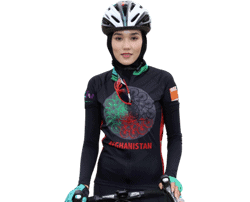Menu

asketball, uSA
Season 3
5
1

Masomah Alizada is the first female Olympic cyclist from Afghanistan, and getting to the Olympics hasn’t just been a battle against her own skills and competitors but also against the Taliban. In this episode, Masomah discusses her departure from Afghanistan, journey to Tokyo as part of the International Olympic Committee (IOC) Refugee Team, and how she cycles for not only freedom but also for the solidarity of women everywhere. As Masomah says, she shares her story to make sure Afghan women are heard and represented. According to Masomah, ” I’m sure one day, things will change. Now it’s like a dark night, but the light of day will arrive…maybe in some years or maybe in some months, but it will arrive. The rights of woman will be given back. So, we have to be hopeful. I continue to think about the women of my country and say that we will never forget you.” For our listeners who want to show support from around the world, Masomah shares that Afghan women take notice when women from other countries share their stories. “When they see that people in USA, Europe, and other countries don’t forget them, it’s big for the women. Even if nothing changes in action, when women of Afghanistan see that people think about them, it gives them hope.” Contributing experts include Dr. Sima Samar (Former Chair, Afghanistan Independent Human Rights Commission), Rukhsar Habibzai (Masomah’s friend and fellow Afghan professional cyclist), and Zahra Alizada (Sister).
Taylor has been in the pool since age 4, when her mom (a swim coach) and older sister (also a swimmer) first introduced her to the water. A D1 recruit at Loyola University Maryland, Taylor was gearing up to make a splash at the collegiate level. She was then diagnosed with Ehlers-Danlos syndrome, a condition characterized by joint pain, loose joints, and hypermobility. According to Taylor, this period of her life was both physically and emotionally excruciating. She shares how she needed to “mourn the life [I] lost but also realize that [I] gained a new life.”
Hearing how important swimming was to her, Taylor’s physical therapist encouraged her to return to the water. One day when at the Loyola pool, the swim coach who recruited her suggested Taylor explore para swimming. This recommendation changed Taylor’s life.
Flash forward to today and Taylor is a 2x S10 American Record Holder and 7x Parapan Games medalist. As Taylor looks to the future, she hopes to see a world in which women are “valued like the men.” She also shares how she hopes to become a Mom and how “women can be strong and powerful” while also at the top of their sport.
Alejandra is the Dominican Republic’s first female Paralympic swimmer, a Parapan American silver medalist, engineer, dog mom, and as she shares, “a 4’3” tall girl promoting inclusion.”
When not swimming (which she does 4-5 hours a day), Alejandra works for the International Paralympic Committee, making sport more accessible for all. As if that’s not enough, she’s also writing her masters thesis. When asked how she juggles it all, she shares that she’s driven by her why. She knows exactly why she’s waking up so early and has crystal clear goals.
In today’s conversation, we talk about her hopes for Paris2024, and Ale shares big news — she’s preparing for her retirement post-Paralympics! She also debunks some of the misconceptions about the Paralympics:
1. Paralympians are elite athletes NOT recreational athletes
2. She’s competing in the Paralympics NOT Olympics (they are different!).
Manasi Joshi has won 10 gold, 9 silver and 15 bronze medals at level 1 international tournaments. She’s a former World Champion (SL3), an engineer, an Arjuna award winner, Aspen Fellow, and has spoken at Harvard.
As Manasi approaches the Paris Paralympics, she’s feeling “stronger than ever.” That said, she’s pauses to flag HOW she hopes journalists and the media should talk about her, or rather how they shouldn’t. She shares, “I don’t want to be called inspirational because I happen to play the sport with a disability. I want to be called inspirational because I put in the same amount of time and effort and show up every day.” Manasi shares that she’d rather have a short column than pages in a magazine focusing on how she’s an inspiration because of her disability.
She’s more than a headline that pulls at people’s heartstrings: she’s an elite athlete who dominates international tournaments and puts in the blood, sweat and tears to make it to the top.
Copyright @2024 Flamebearers Marketed and Designed by Bullzeye Media